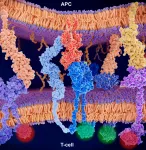(Press-News.org) A microbe found in the colon and commonly associated with the development of colitis and colon cancer also may play a role in the development of some breast cancers, according to new research from investigators with the Johns Hopkins Kimmel Cancer Center and its Bloomberg~Kimmel Institute for Cancer Immunotherapy. Breast tissue cells exposed to this toxin retain a long-term memory, increasing the risk for disease.
In a series of laboratory experiments, researchers discovered that when enterotoxigenic Bacteroides fragilis (ETBF) was introduced to the guts or breast ducts of mice, it always induced growth and metastatic progression of tumor cells. A description of the work is published in the January 6 issue of the journal Cancer Discovery.
While microbes are known to be present in body sites such as the gastrointestinal tract, nasal passages and skin, breast tissue was considered sterile until recently, says senior study author Dipali Sharma, Ph.D., a professor of oncology at Johns Hopkins Medicine.
The study is a first step to show the involvement of ETBF in breast cancer development, Sharma says. Additional studies are needed to clarify how ETBF moves throughout the body, whether ETBF can be a sole driver to directly trigger the transformation of breast cells in humans, and/or if other microbiota also have cancer-causing activity for breast tissue.
"Despite multiple established risk factors for breast cancer, such as age, genetic changes, radiation therapy and family history, a large number of breast cancers arise in women harboring none of these, indicating the need to look beyond," Sharma says. "Our study suggests another risk factor, which is the microbiome. If your microbiome is perturbed, or if you harbor toxigenic microbes with oncogenic function, that could be considered an additional risk factor for breast cancer."
Sharma and colleagues performed several experiments to study the role of ETBF. First, they performed a meta-analysis of clinical data looking at published studies comparing microbial composition among benign and malignant breast tumors and nipple aspirate fluids of breast cancer survivors and healthy volunteers. B. fragilis was consistently detected in all breast tissue samples as well as the nipple fluids of cancer survivors.
In the lab, the team gave the ETBF bacteria by mouth to a group of mice. First, it colonized the gut. Then, within three weeks, the mouse mammary tissue had observable changes usually present in ductal hyperplasia, a precancerous condition. In additional tests, investigators found that hyperplasia-like symptoms also appeared within two to three weeks of injecting ETBF bacteria directly to the teats of mice, and that cells exposed to the toxin always exhibited more rapid tumor progression and developed more aggressive tumors than cells not exposed to the toxin. Breast cells exposed to the toxin for 72 hours retained a memory of the toxin and were able to start cancer development and form metastatic lesions in different mouse models. Investigators also found the Notch1 and beta-catenin cell signaling pathways to be involved in promoting EBFT's role in breast tissue.
In clinical studies, the investigators have started looking for microbiome changes among breast cancer patients to see how this impacts tumor progression and response to therapy. Meanwhile, Sharma says, "we definitely should try to maintain a healthy microbiome, including eating a healthy diet and exercising, and maintaining the correct body mass index."
Down the road, screening for microbiome changes could be as simple as stool sample tests, said lead author Sheetal Parida, a postdoctoral fellow at Johns Hopkins Medicine. "This is just one indicator, and we think there will be multiple," she said. "If we find additional bacteria responsible for cancer development, we can easily look at the stool and check for those. Women at high risk of developing breast cancer might have a high population of some of these."
INFORMATION:
The work was supported by the National Cancer Institute (grants R01CA204555 and CA183804), the Breast Cancer Research Foundation, and Bloomberg Philanthropies.
Study co-authors were Shaoguang Wu, Sumit Siddarth, Guannan Wang, Nethaji Muniraj, Arumugam Nagalingam, Christina Hum, Panagiotis Mistriotis, Haiping Hao, C. Conover Talbot Jr., Konstantinos Konstantopoulos, Kathleen L. Gabrielson and Cynthia L. Sears.
DALLAS - Jan. 6, 2020 - UT Southwestern scientists have developed a new method to study the molecular characteristics of T cells, critical immune cells that recognize and attack invaders in the body such as viruses, bacteria, and cancer.
The approach, described today in the journal Nature Methods, enables researchers to more easily analyze the roles of T cell receptors (TCRs) - the molecules on the surfaces of T cells that are responsible for recognizing pathogens.
"This could lead to a better understanding of how T cells work as well as new ways to harness T cells to fight disease," ...
Philadelphia, January 6, 2021 - A multidisciplinary team of researchers led by Children's Hospital of Philadelphia (CHOP) has discovered several genetic markers associated with bone mineral accrual, which could ultimately help identify causes of eventual osteoporosis earlier in life through genetic testing. The findings, which were made possible by following a group of children over several years, were published online by the journal Genome Biology.
Osteoporosis is widely considered a disease of old age. However, the accrual of bone density early in life is critical for achieving optimal bone mass in adulthood ...
Using a blood test, a German-Dutch research team has predicted the risk of Alzheimer's disease in people who were clinically diagnosed as not having Alzheimer's disease but who perceived themselves as cognitively impaired (Subjective Cognitive Declined, SCD). The researchers analyzed blood samples from an SCD cohort supervised at the Alzheimer Center Amsterdam. Using a test developed at Ruhr-Universität Bochum (RUB) called the Immuno-Infrared Sensor, they identified all 22 subjects at study entry who developed Alzheimer's dementia, thus the clinical symptoms, within six years. The test ...
Maybe you're like us. We're the folks who are on our smartphones almost all the time, even when we're with others. We know it annoys a lot of people, but we do it anyway. Why?
Researchers at the Norwegian University of Science and Technology (NTNU) have looked at why people in cafés pull out their phones, and how this affects café life. Three main reasons they identified are: to delay or pause a conversation (interaction suspension); to get out of a conversation (deliberately shielding interaction); and to share something with others (accessing shareables).
But what does that actually mean?
The smartphone is the world's most ubiquitous personal tech gizmo. ...
Post-traumatic stress disorder, or PTSD, affects many people who are exposed to extreme situations, such as torture. Recent research suggests that chronic pain may make it more difficult to treat trauma.
"Trauma-focused therapy is effective for many patients with PTSD, enabling them to talk through the trauma they experienced", according to Iselin Solerød Dibaj, a psychologist at Oslo University Hospital.
However, not everyone benefits equally from this form of therapy.
"Torture victims who struggle with both chronic pain and PTSD unfortunately often reap less benefit from ordinary treatment," says Dibaj.
The Red Cross estimates that between 10 000 and 35 000 people with a refugee background who have come to Norway have experienced torture, reflecting ...
The Earth is populated by an increasing number of people who demand more and more products, which is simply not viable in the long run. Our planet does not have unlimited resources. Emissions are harming the environment in various ways.
More companies thus need to switch to more sustainable production, sometimes due to pressure from consumers, but often resulting from new rules imposed by the authorities.
But this kind of change can't ever pay off - or can it?
A new study by a research group from the Norwegian University of Science and Technology (NTNU) has reviewed 100 articles on how sustainably oriented innovation affects companies' competitiveness.
"The ...
All athletes want to be at the top of their game when they compete, but some resort to nefarious approaches to achieve peak muscle growth, speed and agility. Recent developments in gene editing technology could tempt athletes to change their DNA to get an edge. Now, researchers reporting in ACS' Analytical Chemistry demonstrate first steps toward detecting this type of doping both in human plasma and in live mice.
The gene editing method called CRISPR/Cas is a popular way for scientists to precisely change the DNA in many organisms, and it recently gained even more attention when key developers of the method were awarded the 2020 Nobel Prize in Chemistry. With this method, researchers add an RNA molecule and a protein into cells. The RNA molecule guides the protein to the appropriate ...
Conductive ink is a great tool for printing flexible electronic circuits on surfaces. But these inks can be costly, they do not work on some materials, and devices to apply them can plug up. Now, scientists report in ACS Applied Electronic Materials that they have developed inexpensive conductive inks for clog-free ballpoint pens that can allow users to "write" circuits almost anywhere -- even on human skin.
Flexible electronics are widely used in applications such as biosensors, electronic skin and energy storage. Recent advances to produce such devices include pens ...
Often considered the world's oddest mammal, Australia's beaver-like, duck-billed platypus exhibits an array of bizarre characteristics: it lays eggs instead of giving birth to live babies, sweats milk, has venomous spurs and is even equipped with 10 sex chromosomes. Now, an international team of researchers led by University of Copenhagen has conducted a unique mapping of the platypus genome and found answers regarding the origins of a few of its stranger features.
It lays eggs, but nurses, it is toothless, has a venomous spur, has webbed feet, fur that glows and has 10 sex chromosomes. Ever since Europeans discovered the platypus in Australia during ...
Using copper foil, glass containers and a conventional household microwave oven, University of Wyoming researchers have demonstrated that pulverized coal powder can be converted into higher-value nano-graphite.
The discovery is another step forward in the effort to find alternative uses for Wyoming's Powder River Basin coal, at a time when demand for coal to generate electricity is declining due to concerns about climate change.
In a paper published in the journal Nano-Structures & Nano-Objects, the UW researchers report that they created an environment in a microwave oven to successfully convert raw coal powder into nano-graphite, which is ...



